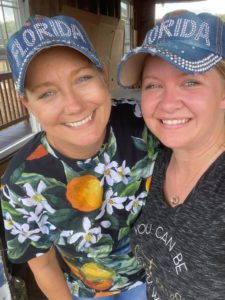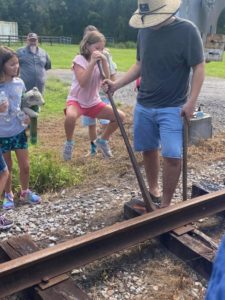[Best_Wordpress_Gallery id=”42″ gal_title=”Kirby Railroad”]
WILLISTON, Fla. – The Kirby Family Farm isn’t a farm in the usual sense, even if it does produce a few acres of hay and peanuts now and then. It is a farm, though, if you see it like Tracy Kirby sees it.
“Our main crop,” she says, “is kids.”
Ten years ago, Tracy, a former public-school teacher, and her husband, Daryl, bought 110 acres next to this town of 2,700 because, well, Daryl found a century-old train so deep in the woods, squirrels were living in the engine.
The train led to the land. Which led to more trains (nine locomotives and counting). Which led to a mission – helping disadvantaged kids – that the Kirbys have poured their hearts into.
The Kirby operation has 1.3 miles of track, a Ferris wheel, a wooden building that mimics a street front from the Wild West, and a crazy list of other odds and ends that have turned this “farm” into a campy, nothing-else-like-it destination.
The proceeds from Scary Train, Christmas Train, Wild West Weekend and all the other colorful events the Kirbys dream up are plowed into programs for kids – sick kids, foster kids, kids with special needs …
So of course the farm has a home school, too.

Tracy Kirby started a homeschool co-op two years ago, wanting to ensure her 6-year-old daughter, Kari, had a community around her. Kari has Marfan syndrome, an inherited disorder that affects connective tissues and can cause heart problems.
The first year, the co-op had 10 students. Then COVID-19 happened. Now it has more than 40, most of them elementary- and middle-school aged, with another 15 on a waiting list. More than half were formerly in public schools.
“I got bombarded,” Kirby said.
Distance learning was especially challenging in remote areas with spotty connectivity, Kirby said. She told the frustrated parents who came to her: “You’re the teacher. But I’ll hold your hand, and you’ll have me in your back pocket.”
Wild as it sounds, this little co-op in a corner of Florida best known for clam farms and cave diving points to the future of public education. It’s teacher empowerment, “learn everywhere” and innovate anywhere all rolled into one.
More teachers like Kirby are finding they have the power to create their own models, especially in states like Florida, where education choice has become mainstream. More parents are seeing the value of options that allow children to learn beyond traditional programs in traditional classrooms.
For icing on the cake, the Kirby co-op chips away at the odd myth that “school choice” can’t work in rural areas. In Florida, there’s plenty of evidence it does. (See here, here, and here.)
To get to the Kirby’s, head west from I-75, halfway between Gainesville and Ocala. Urban sprawl gives way to rolling pasture and log trucks loaded with pines. If you get to a zippy mart with a rooster in the parking lot, you’ve gone too far. But if you see a hearse on the edge of a sorghum field – on the side it says “Scary Train” in pink letters – hey, you’ve made it!
The parents in the co-op represent a cross-section of the community. They’re waitresses and engineers, physical therapists and correctional officers, cashiers and construction company owners. What binds them is this approach to educating kids, and their trust in Tracy Kirby.
Beneath the baseball cap with the Florida logo is a highly skilled educator who knows exactly why so many parents want options.
Kirby was an elementary school teacher for six years. She left the classroom to homeschool when her sons were in middle school. She pulled her oldest, A.J., when he was in eighth grade and having behavior issues. She found out later he was being bullied.
Homeschooling changed everything, fast.
“I saw so much improvement in his confidence and well-being,” she said. “It was eye-opening.”
Garrett’s challenges were academic. With homeschooling, Kirby saw he needed more time with certain subjects, and topics that better held his attention. At one point, the two of them shaped a program of study about birds that included helping with a University of Florida project that required catching, tagging, and tracking them. Garrett loved it.
“I was just able to customize it,” Kirby said. “I had the flexibility.”
Along the way, Kirby attended a convention in Orlando with thousands of other homeschool families. She called it life changing.
“I had 8-year-olds walking up to me, asking me, ‘Can we build an app for Kirby Family Farm?’ I was like, ‘Whaaaaat?!!’ What is this homeschool world?”
Once Kirby began homeschooling, other parents began asking her for help. That led to tutoring. Now Kirby tutors about 15 students in a wide variety of subjects.
Then came the co-op, which has become an umbrella for a wide range of services. Besides classes a few hours once a week, Kirby helps parents design learning programs, find the right curriculum and materials, and prepare the portfolios they need to satisfy home education requirements.
Kirby co-op parent Jennifer MacCord said her 11-year-old son Korbin struggled in a district school, especially during the pandemic. ADHD made it hard for him to stay focused during long stretches of screen time. So about a year ago, she and her husband decided to homeschool him. Now Korbin is excelling, she said, because Kirby helped her create a program that plays to his strengths.
“School and learning should be about catering to the person,” said MacCord, a stay-at-home mom and surgical tech by training. “My son is hands on. He needs hands on.”
Through the co-op, Korbin has built a volcano and dissected owl pellets. He’s worked on public speaking. He’s also overcome his shyness by volunteering to be an actor during the Scary Train production. (Truth be told, Korbin is a very good evil clown.)
“He’s more outgoing,” MacCord said. “He’s found himself.”

At the co-op, the classroom extends into the “farm.” The science lab is in the Wild West building. The kids have learned botany by picking peanuts. They got to literally feel the benefits of technology by removing railroad spikes – first with a crowbar, then with a battery powered spike puller.
When Kirby surveyed co-op parents to ask what they needed the most help with, the majority said science. So, she developed a science lab and shifted the curriculum to include more science.
The lab feels a bit like an open-air barn, with wood beams crossing the ceiling beneath a tin roof. Textbooks are stacked on a table. A periodic table hangs from the walls, along with posters about the water cycle, the human skeleton, the layers of the Earth.
On a recent class day, Kirby kicked off a lesson with a “wonder lab” question: “What do you wonder about … spiders?” The answers:
“I wonder how spiders crawl on the walls.”
“I wonder what the chemical composition of the webs are.”
“I wonder why daddy long legs are arachnids but not spiders.”
In case you’re wondering, the kid who asked the last question is nine years old.
This was also “Takeover Day.” As soon as science ended, a handful of students took over as teachers to show their classmates how to make Halloween crafts. One had picked puppets; another, “spider pops”; another, flying ghosts made from paper cups and crepe streamers. The goal was for students to exercise leadership and communication skills.
And to have fun doing it.
When Kirby asked the kids to give a thumbs up if they’d been working on their creative writing pieces for Halloween, not only did all of them give a thumbs up, some of them jumped up and down.
Kids giddy about writing? In a building that looks like the OK Corral? On a farm full of trains?
What is this homeschool world?



[…] This article original appeared at reimaginED. […]